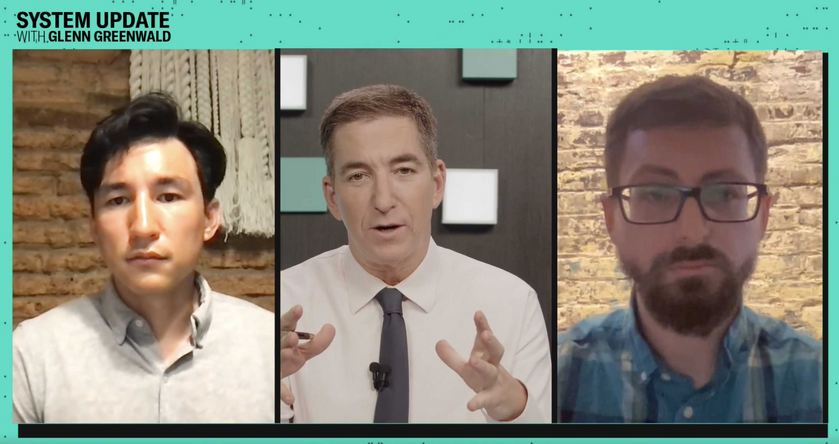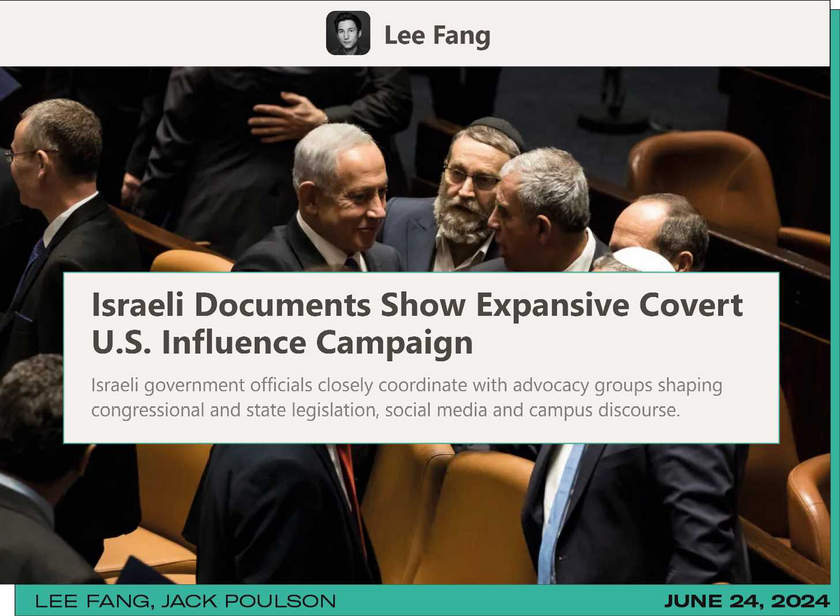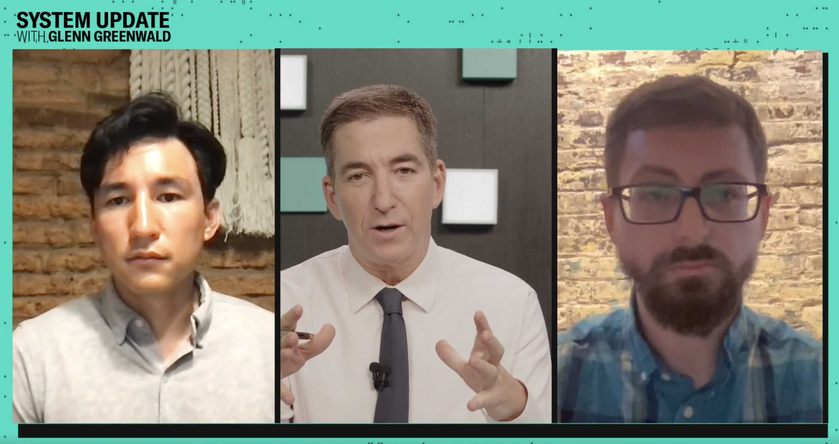The Interview: Journalists Lee Fang and Jack Poulson

As we said at the very top of the show, there was an incredibly entertaining and highly revealing meltdown by a CNN host, Kasie Hunt, that we wanted to cover. It says so much about the mindset of these kinds of journalists, which is a very important topic as we approach the presidential debate, the first one run by CNN, on Thursday. But because we had to cover and wanted to cover that much more important breaking news about Julian Assange's long overdue freedom, we're going to go ahead and postpone that segment until tomorrow night.
Instead, we’ll go to another breaking story, an independent reporting, an original and very important reporting, that was published today about the extent of the Israeli influence operation machine inside the United States. It was done by two highly accomplished independent journalists. Lee Fang is one of them. He was a colleague of mine back at The Intercept and after wisely leaving that outlet before it completely sunk into the sea, he is now doing that work at his own Substack, where he regularly breaks big stories using standard and tireless investigative techniques, which is why he is so often on our show: he's constantly breaking those kinds of stories through just sheer, hard investigative work. His coauthor on this story is Jack Paulson, who is an independent journalist who focuses on the intersection of technology and the military. He completed his PhD in computational and applied mathematics at UT Austin, in 2012, before serving as an assistant professor of computational science and engineering at Georgia Tech, and then an assistant professor of mathematics at Stanford University.
The duo teamed up in a journalistic investigation that was published today in collaboration with The Guardian, into the extent of the Israeli Influence campaign aimed at the United States.

This is obviously a topic that we have been covering for quite some time. We think it is of the utmost importance that there is a foreign country that is working very hard with a lot of money to not only influence public opinion but also the laws that the United States and our federal legislature enact that have a very direct relationship with that foreign government. And we are delighted to welcome both of them to the show.
G. Greenwald: Good evening. It's great to see you guys both. Congratulations on this story. And I just want to kind of dive right into these questions because I do have a fair number of them. I guess you guys can decide amongst yourselves who's going to answer. If you want. I can just direct them. But let me just ask, let me ask each of you, actually, and, Jack, you can go first. As I said, there's been a lot of reporting recently, over many years, as well as recently, about the extent of what the Israelis are doing to influence American politics, the lawmaking process and American public opinion. What is one or two of what you think are the most significant new revelations in the story that you published?
Jack Poulson: Yeah. So, there is a U.S. nonprofit called the Institute for the Study of Global Antisemitism and Policy, which is a bit of a mouthful there, pronounced ISGAP. It was originally a center within Yale. It was kind of kicked out in 2011 for not being sufficiently rigorous. What I think hasn't really been paid attention to is that they have publicly claimed credit for the hearings that led to the firings of the several university presidents, for example, in particular, claiming credit for the December 5 hearings in front of Congress, where Elise Stefanik really grilled Harvard president, Claudine Gay. And basically, we traced out what led to that, in particular their reports on alleged influence on U.S. student campus protests and then how that fits into broader, kind of formal public-private partnership that's pretty widely reported, known as Concert or – you know, it's undergone several different names, it kind of uses all of them interchangeably to this day – Originally it was Kela Shlomo, then it was Concert, and now it's Voices of Israel. And it's really a way for the Israeli government to chip in half the money and then for philanthropists in the U.S. and around the world to chip in the other half to fund kind of pro-Israeli nonprofits to advocate and lobby on behalf of the Israeli government.
G. Greenwald: So, Lee, if you want to pick one or two nuggets of the story that you think provide kind of new revelations about the influence campaign by this foreign government inside the United States, please do so. But also, let me just add to that the kind of broader perspective of what the significance is of the fact that Israel is doing this.
Lee Fang: Well, look, I’m just a few weeks into the Gaza war. There was a discussion in the Knesset, the Israeli parliament, about what to do around all of these students at universities, particularly elite universities, where there's a lot of influence in American society, that were critical of Israel. And there was a government minister, Amichai Chickli, who said, “Don't worry, we're going on the offensive – and I'm paraphrasing him – “and we're going to do it in a Concert way.” And he's referencing what Jack was just talking about, this kind of semi-covert organization that's controlled by the Israeli government and ran these kinds of covert PR campaigns in the past. You know, they were set up to be a “PR commando unit” to control kind of troll armies on social media to lobby in the U.S. to actually help pass laws in the U.S. They were partially responsible for the passage of anti-BDS laws over the last few years and in state capitals around the country. Well, after October 7, there was a relaunch of this unit and it's partnering with a number of groups. Some of its partners are doing outreach to black Democrats. They have a partner organization in the U.S. that's mobilizing support from lawmakers from the African American community. Many of their former leaders are working with an Israeli NGO but very active in the U.S. that's helping Meta – You know, that's Facebook, WhatsApp and Instagram, as well as TikTok, censor media. And, you know, they're using the same rubric that, you know, many other NGOs use, Media Matters and ADL and others, saying that “we're just here to provide assistance in stopping misinformation, disinformation, hate speech,” but they're very clearly working with the Israeli government in censoring and content moderating speech that's critical of Israel.
In addition to all that, just as this same entity worked to pass anti-BDS laws in the past, and that's been well-documented, what we documented here that's completely new is that they are openly discussing their strategy to pass laws like the IHRA, International Holocaust Remembrance Alliance, the definition of antisemitism and to basically encode that into U.S. law, state law, federal law. We saw the passage of the bill in the House last month on education policy, but there's similar laws around the country that basically say that a form of illegal discrimination, of antisemitism, is certain forms of harsh criticism. You know, it's saying terms or slogans like “Israel is a racist country” that now can be viewed as a hate crime or as an illegal form of discrimination. That's a big part of their agenda, redefining the term antisemitism, just to stifle certain criticisms of Israel. We were able to obtain exclusive documents showing that even the Israeli Foreign Ministry has been in touch with these local state lawmakers in Florida, to pass this type of legislation. They're openly talking about it in the Knesset, saying this is their top priority. They're saying they're very clear in discussing their strategy. And we looked at transcripts, we looked at various business filings, public documents and government contracts. We really blended together a lot of sources to tell the story.
G. Greenwald: Absolutely. I really encourage people to read it on their own. We're not going to be able to do every part of it here tonight. I want to kind of highlight the important parts and then draw out the implications.
I just want to add one thing, which is the very first story that I ever reported in my entire life on the question of big tech censorship at the behest of government was at the end of 2015, maybe the beginning of 2016, when there was a document that was released showing that the Israeli government had an ongoing relationship with the top leadership of Facebook, where they were able to submit lists of Facebook pages that the Israeli government alleged were promoting terrorism or were in some way inciting hatred toward Israel. And that basically means any page run by Palestinians that were critical of Israel. And in something like 98% of the cases, Facebook was taking these requests and approving them and banning whatever accounts the Israelis indicated. And of course, this has been going on since then, […] meetings Israel has with big tech companies and saying, we demand that you remove “disinformation.” One of the things they listed as disinformation was the idea that the Israeli military actually killed some of their own citizens on October 7, and it is now proven beyond any shadow of a doubt is true. The Israeli government even acknowledges that. So, they're trying to prevent and, again, not in Israel, but in the United States, the ability for Americans to express certain views. And yet another example where the right – parts of the right –have been indignant about this sort of government-Big Tech collaboration to censor. And this is one of those areas where, magically, the pro-Israel part of the right seems to have no problem.
Jack, let me ask you. I want to hear your view on this as well, Lee. There's been this kind of obsession on the part of certain segments of the American punditry with what's going on in American colleges for quite some time. And there's always been this kind of strange – you can even say creepy – dynamic where like 45-year old writers from like The New Republic, like, you know, New York Magazine and those kinds of places are just constantly focused on what 19- and 20-year olds are doing and writing articles about that on college campuses like one of the arguments you could make is that, well, the reason you have to focus on that is because these people and those trends become in the future the leaders, shaping our culture. But one of the things I've started to believe over the last kind of 18 to 24 months, a lot of those pundits who have been focused on colleges happened to be among the most vocal supporters of the Israeli government and all of us media. They justify this focus on colleges under an “anti-woke” banner, like people like Bari Weiss and Ben Shapiro, that whole crowd. At the same time, there have been strategy documents from the Israeli government saying the most important thing that we need to do is focus on American college campuses and prevent the growth of anti-Israel sentiment on American college campuses because that is such a threat to our national interests. What have you been able to discover in this new reporting about the priority that the Israeli government has been giving to try to control or influence American citizens or American college campuses?






















